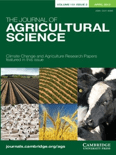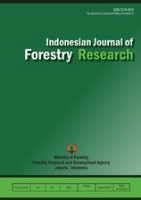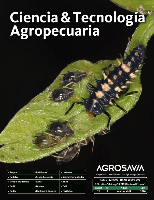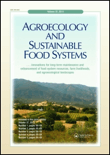
AGROFORESTRY SYSTEMS
Scope & Guideline
Bridging agriculture and forestry for sustainable solutions.
Introduction
Aims and Scopes
- Sustainable Land Use Practices:
The journal emphasizes research on sustainable agroforestry systems that combine agricultural and forestry practices to improve land use efficiency and ecological balance. - Agroecological Benefits:
Research focuses on the ecological benefits of agroforestry, including biodiversity conservation, soil health, water management, and climate change mitigation. - Socioeconomic Impacts:
The journal explores the socioeconomic aspects of agroforestry, including farmer perceptions, adoption barriers, and the impact of agroforestry on rural livelihoods and food security. - Innovative Agroforestry Techniques:
It includes studies on innovative practices and technologies that enhance agroforestry productivity and sustainability, such as intercropping, silvopastoral systems, and agroecological principles. - Carbon Sequestration and Climate Resilience:
Research on the role of agroforestry in carbon sequestration and enhancing the resilience of agricultural systems to climate change is a key focus area.
Trending and Emerging
- Climate-smart Agroforestry Practices:
There is a rising focus on climate-smart practices that enhance resilience and adaptation of agroforestry systems to climate change impacts, highlighting the importance of sustainability. - Integration of Technology in Agroforestry:
The incorporation of digital technologies, remote sensing, and machine learning in agroforestry research is becoming increasingly popular, facilitating better management and assessment. - Nutritional and Economic Benefits of Agroforestry:
Research is trending towards understanding the nutritional quality of agroforestry products and their economic implications for smallholder farmers, reflecting a shift towards food security. - Agroforestry and Biodiversity Conservation:
There is an emerging interest in the role of agroforestry systems in conserving biodiversity, particularly in the context of habitat restoration and ecosystem services. - Interdisciplinary Approaches:
The journal is increasingly publishing interdisciplinary studies that integrate social, economic, and environmental perspectives, reflecting the complex nature of agroforestry systems.
Declining or Waning
- Traditional Agroforestry Knowledge:
Research that focuses on traditional agroforestry practices and indigenous knowledge has seen a decline, possibly as modern scientific approaches gain more emphasis in the journal. - Single-Crop Agroforestry Systems:
There is a reduced emphasis on studies that focus solely on single-crop systems within agroforestry, as the trend shifts towards integrated and multifunctional systems. - Basic Ecological Research:
While ecological studies remain important, there appears to be a decrease in fundamental ecological research within the agroforestry context, with a greater focus on applied and interdisciplinary studies. - Local Case Studies Without Broader Implications:
Publications that present local case studies without broader implications or connections to global agroforestry challenges seem to be less frequent, as the journal increasingly seeks studies with wider relevance. - Exploratory Studies in New Regions:
The journal has shifted away from exploratory studies in new regions that do not build on existing knowledge, favoring more in-depth analyses and applications of established agroforestry practices.
Similar Journals

Ecosistemas y Recursos Agropecuarios
Empowering researchers to tackle global agricultural challenges.Ecosistemas y Recursos Agropecuarios is a distinguished academic journal published by the Universidad Juárez Autónoma de Tabasco through its Dirección de Investigación y Posgrado. Established in 2001, this journal has embraced the Open Access model to ensure that vital research in agriculture and environmental sciences is accessible to a broader audience, fostering knowledge sharing and collaboration globally. The journal's mission is to publish high-quality, peer-reviewed research that advances the understanding and management of agroecosystems and natural resources, making it a key resource for researchers, professionals, and students involved in related fields. Located in Villahermosa, Tabasco, Mexico, the journal's commitment to addressing pressing regional and global challenges in agriculture and sustainability enhances its importance in today’s academic landscape. With an emphasis on innovative solutions and interdisciplinary approaches, Ecosistemas y Recursos Agropecuarios plays a critical role in enriching the discourse on sustainable development and resource management.

Floresta e Ambiente
Connecting researchers to promote sustainable forest management.Floresta e Ambiente is a pioneering open-access journal dedicated to advancing knowledge in forestry and environmental science, published by the Federal Rural University of Rio de Janeiro's Institute of Forests. Since its inception in 2012, this journal has emerged as a crucial platform for researchers, professionals, and students to disseminate innovative findings and foster discussions on sustainable forest management, conservation practices, and the ecological significance of forests in Brazil and beyond. With an impressive impact factor and a commendable ranking in the SCOPUS database, positioned in the 49th percentile of the Agricultural and Biological Sciences category, Floresta e Ambiente actively supports the dissemination of high-quality research while contributing to the global discourse on forestry. As an open access journal since 2013, it ensures that valuable knowledge is readily available to all, enhancing collaboration and engagement within the scientific community.

BOIS ET FORETS DES TROPIQUES
Pioneering Research on Tropical BiodiversityBOIS ET FORETS DES TROPIQUES is a distinguished journal published by CIRAD-CENTRE COOPERATION INT RECHERCHE AGRONOMIQUE POUR, based in France. The journal is committed to disseminating high-quality research in the domains of ecology, forestry, and environmental science, reflected by its impressive ranking in multiple Scopus categories, including Q2 in Forestry and Q3 in Ecology. With an ISSN of 0006-579X and an e-ISSN of 1777-5760, BOIS ET FORETS DES TROPIQUES serves as a vital platform for scholars and practitioners to explore and share insights about tropical forests and their ecosystems. Although it operates under a subscription model without open access options, the journal plays a crucial role in advancing research and practices essential for sustainable forest management and biodiversity conservation in tropical regions. Its ongoing publication from 2010 to 2024 ensures a continuous contribution to the academic community, fostering a deeper understanding of ecological dynamics and promoting innovative approaches within the field.

JOURNAL OF AGRICULTURAL SCIENCE
Pioneering Research in Crop and Animal ScienceJOURNAL OF AGRICULTURAL SCIENCE, published by Cambridge University Press, stands as a pivotal resource in the field of agricultural research. With a rich history dating back to 1905, this esteemed journal has consistently delivered cutting-edge scholarly articles that address pressing issues in agronomy, crop science, animal science, and genetics. Currently holding a Q2 ranking in Agronomy and Crop Science and Animal Science and Zoology, and a Q3 in Genetics, it reflects a robust impact within the academic community, contributing to innovative practices and technologies in agriculture. Indexed in Scopus, its authors benefit from broad visibility, supported by a strong readership among researchers, professionals, and students alike. While the journal does not currently offer open access, its rigorous peer-review process ensures that published works meet the highest scholarly standards, fostering a rich environment for knowledge exchange and advancement in agricultural science.

Indonesian Journal of Forestry Research
Transforming ecological understanding into actionable solutions.The Indonesian Journal of Forestry Research is a distinguished, peer-reviewed academic journal published by the Ministry of Environment & Forestry of Indonesia. With an ISSN of 2355-7079 and E-ISSN 2406-8195, this journal has been an Open Access platform since 2014, fostering international collaboration and knowledge sharing in the fields of ecology and forestry. As of 2023, the journal holds a respectable Q3 category in both Ecology and Forestry, reflecting its contribution to the science community. It ranks #99/174 in Forestry and #305/461 in Ecology in Scopus, indicating its growing influence in the respective fields. Aimed at researchers, professionals, and students, the Indonesian Journal of Forestry Research provides vital insights and findings, supporting sustainable forestry practices and environmental management in Indonesia and beyond. With an emphasis on innovative methodologies and applied research, this journal stands as a pivotal resource for those dedicated to advancing forestry science and ecological research.

Revista Corpoica-Ciencia y Tecnologia Agropecuaria
Advancing Agricultural Innovation for a Sustainable Future.Revista Corpoica-Ciencia y Tecnologia Agropecuaria is a premier open access journal dedicated to the dissemination of innovative research in the field of agricultural and biological sciences. Published by CORP COLOMBIANA INVESTIGACION AGROPECUARIA-CORPOICA, this journal has been a key resource for professionals and academics since its inception in 1996, providing valuable insights into the challenges and advancements in agro-technology. As a recognized journal with a Q3 ranking in its category for 2023, it operates with a mission to enhance knowledge transfer and foster collaboration among researchers in Colombia and beyond. The journal is indexed in Scopus, which highlights its commitment to maintaining rigorous academic standards and broadening the scope of agricultural research. With an emphasis on advancing sustainable agricultural practices and technological innovations, Revista Corpoica serves as an essential platform for sharing groundbreaking studies, reviews, and original research that contribute to the growing body of agricultural knowledge. Researchers, professionals, and students alike will find this journal an invaluable tool to stay informed and engaged with the latest advancements in agricultural science.

Revista de Agricultura Neotropical
Unlocking the Potential of Tropical Crop ManagementRevista de Agricultura Neotropical, published by UNIV ESTADUAL MATO GROSSO SUL, serves as a pivotal platform for disseminating research in the fields of agronomy and crop science. Since its inception as an open-access journal in 2014, it has been dedicated to promoting innovative research and practical applications within the agricultural sector, specifically tailored to the challenges and dynamics of the tropical agriculture landscape in Brazil and beyond. Although currently positioned in the Q4 quartile of Scopus rankings, and with a modest agricultural science percentile, the journal actively encourages contributions that highlight sustainable agricultural practices, tropical crop management, and emerging technologies in farming. With its commitment to open access, the Revista de Agricultura Neotropical broadens the reach of critical knowledge, making it accessible to researchers, professionals, and students alike, thus fostering a collaborative environment for advancing agri-scientific initiatives.

Agroecology and Sustainable Food Systems
Empowering change through agroecological knowledge.Agroecology and Sustainable Food Systems, published by Taylor & Francis Inc, is a premier academic journal dedicated to advancing the science of agroecology and its applications in sustainable food systems. With an impact factor that reflects its significant influence in the field, this journal serves as a vital resource for researchers, industry professionals, and students engaged in sustainability, agriculture, and environmental studies. As of 2023, it proudly holds a Q1 ranking in Agronomy and Crop Science, as well as Q2 rankings in Development and Renewable Energy, Sustainability, and the Environment categories. Covering a broad spectrum of topics, it not only shares peer-reviewed research but also encourages discourse on innovative practices and policies that enhance food security and ecological balance. Available for access through various options including Open Access, the journal's commitment to knowledge dissemination is further underscored by its substantial rankings on Scopus, with notable percentiles across multiple disciplines. By focusing on agroecological principles and their socio-economic implications, Agroecology and Sustainable Food Systems is essential for those looking to stimulate meaningful change in agricultural practices and sustainability initiatives worldwide.

Forest and Society
Innovating forest governance for global impact.Forest and Society is a premier peer-reviewed journal that serves as a significant platform for researchers, practitioners, and policy-makers in the fields of forestry, geography, and social sciences. Published by the Faculty of Forestry at Universitas Hasanuddin in Makassar, Indonesia, this Open Access journal has been committed to disseminating high-quality research since its inception in 2017. With an impressive impact profile, as evidenced by its Q1 quartile ranking in Forestry and Political Science for 2023, Forest and Society effectively connects innovative research with pressing global issues related to forest management and sustainable development. The journal's objectives include fostering interdisciplinary collaboration and driving insightful discussions around conservation practices and socio-political dimensions of forest governance. By providing unhindered access to invaluable resources, Forest and Society aims to empower the academic community and enhance the sustainable stewardship of forest resources.

Trees Forests and People
Exploring the Vital Connections Between Nature and HumanityTrees, Forests and People is an esteemed peer-reviewed journal published by Elsevier that commenced its journey in 2020 and focuses on the intricate relationships between trees, forests, and human communities. With its E-ISSN of 2666-7193, this journal serves as a vital platform for presenting cutting-edge research in disciplines such as forestry, environmental science, and management. Recognized for its impact within the academic community, it has achieved a prestigious Q1 ranking in both Economics, Econometrics and Finance (Miscellaneous) and Forestry, alongside a Q2 ranking in Management, Monitoring, Policy and Law as of 2023. Its Scopus rankings indicate robust positioning in various fields, appealing to a diverse audience of researchers, professionals, and policy-makers engaged in sustainable forest management and ecosystem services. By offering open access options, the journal ensures that critical findings are readily available to a global audience, fostering knowledge sharing and collaborative efforts aimed at addressing the pressing challenges in forest conservation and management.